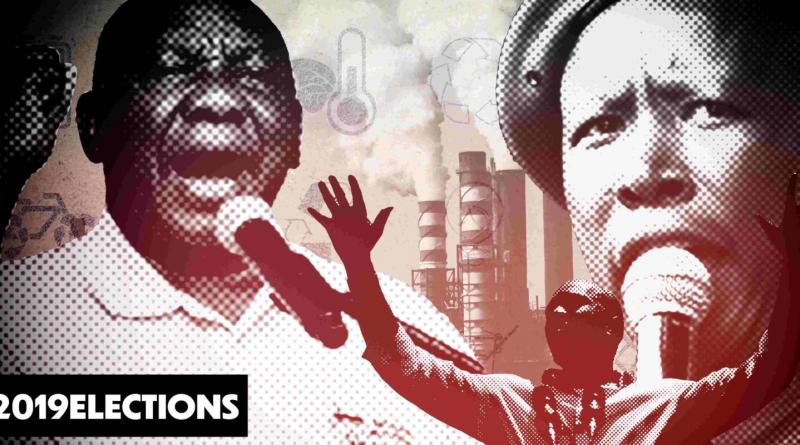South African leading parties aren’t in the green for environmental policies.

On 8 May South Africans won’t see a green party on the ballot paper. Instead, what they will see is political parties with lofty claims of bettering the South African environment and pushing the ‘Green Revolution’ for political gain.
Section 24 of the Constitution says that everyone has the right to an environment that is not harmful to their health or well-being; and to have the environment protected, for the benefit of present and future generations, through reasonable legislative and other measures that prevent pollution and ecological degradation; promote conservation; and secure ecologically sustainable development and use of natural resources while promoting justifiable economic and social development.
Despite this, the EFF only has 18 points on environmental policies in its 170-page long manifesto. Similarly, the current ANC government’s manifesto makes fewer than 20 eco-friendly promises, including repositioning Eskom (again) and an investigation into the cost-benefit of installing solar panels in state buildings.
In comparison to the ANC and EFF, the DA has a far longer list of green policies and ideas included in its manifesto, although much of this includes examples of their successful implementation of green policies.
And while South Africans will have seen The Green Party of South Africa listed on ballots in the past, the party has struggled to garner any national support. Other than The Green Party, the United Democratic Front (UDM) has perhaps the most comprehensive policy on environmental affairs.
When speaking to Greenpeace, 350 Africa, Climate Reality and the Centre for Environmental Rights, all four environmental action groups reiterated that climate change is a reality that South Africans have to take seriously. The country’s environment is already being negatively impacted by the realities of global warming, and without a concrete commitment to environmental policies, South Africa may have little ‘green’ left to show the next generation.
So how do the main parties contesting the upcoming elections stack up on the green front?
‘Green’ Mining
Although US President Donald Trump has repeatedly tweeted about “clean coal”, environmentally-friendly mining is a myth. Despite this, the majority of political parties have committed to improving or expanding the current mining industry.
In South Africa in particular, mining has a long and controversial history.
“Our history in mining has shown that the mining activities have, by and large, not benefited mining-affected communities. Furthermore, many mining-affected communities have had their land and environment polluted and degraded, leaving them with very few land use options once the mining company ceases to operate or scales down its mining activities,” says Leanne Govindsamy, Programme Head of Corporate Accountability and Transparency for the Centre for Environmental Rights.
The EFF manifesto outlines how the party will force the mining sector to go green through rehabilitating old mines. In its manifesto, the party declares: “The EFF government will require all mining companies to pay for the rehabilitation of mines that they have abandoned and for the draining of acid water.”
This statement is repeated in two of the other 17 environmentally-friendly points in the manifesto.
In comparison, the ANC manifesto does not mention anything about the environmental effects of the mining sector, while the DA has an entire, albeit small, section dedicated to going green underground. Similarly to the EFF, the DA manifesto declares a commitment to reversing historic acid mine drainage problems.
“User (sic) stricter enforcement protocols, including criminal charges, against mines that discharge untreated mine water into water courses,” says the DA.
From an environmental perspective, holding mines accountable for untreated wastewater is hugely beneficial. Water that is used during the mining process becomes acidic and, upon release into groundwater, changes the pH value of the surrounding water sources. This acidic water then evaporates and creates acid rain.
A 2017 investigation by environmental investigative journalism group Oxpeckers found that nearly R60-billion is held in funds to be used for the environmental rehabilitation of mines across the country. These funds cannot be touched until mine is officially closed, and yet, according to Oxpeckers, only 1% of all closing certificates in the country from 2011-2016 were issued in Mpumalanga, South Africa’s biggest mining province.
One of the theories among activists is that the Department of Mineral Resources isn’t interested in officially closing mines, because it will then be responsible for rehabilitation. So large companies sell mines to smaller companies, shirking environmental responsibility, or simply leave mines abandoned.
Both the EFF and the DA claim mining companies should be held responsible for closed and operational mines, and with coal mining forming such a large part of the South African economy political parties should crack down on irresponsible mining companies. But both parties fail to mention what will happen to the money currently allocated to rehabilitating mines.
Air Pollution
Eskom recently revealed that the power utility’s plants result in the death of approximately 333 people per year from ailments relating to air pollution. According to a report by Mail & Guardian, the power utility estimates these deaths cost the economy approximately R18-billion a year.
But in 2017, a report by Dr Mike Howard, commissioned by environmental justice organisation GroundWork, found that approximately 2,239 South Africans die every year from illnesses related to coal firing and production. With an estimated 996,628 lost working days, this equates to approximately R32-billion a year.
In 2018, environmental activist group Greenpeace published a report claiming that Mpumalanga, home to 12 of Eskom’s coal-fueled power plants, has the highest levels of Nitrogen Dioxide (NO2) across six continents. NO2 is a powerful pollutant and contributes to the area’s poor air quality.
In order to change the quality of air in areas such as Mpumalanga, South Africa will have to begin transitioning from coal-based energy to renewable energy in the forms of wind, hydraulic and solar power. Despite the historically low cost of coal, South Africa remains a resource-rich country with huge potential for alternative energy sources, says Action 24 Project Manager Noëlle Garcin.
None of the top political parties, including the DA, ANC, UDM and Freedom Front Plus (FF+) include any plans of action to prevent further loss of life from polluted air.
The African Christian Democratic Party (ACDP) has the most comprehensive commentary on air pollution, particularly in comparison to other major political parties. The party claims that: “Large industries are known to be producing large volumes of health-threatening pollution with impunity,” and poorer communities, in particular, communities who live near mines, are most affected by poor air quality. While it does not propose specific goals to reduce air pollution, the party does suggest the necessity of regulating factories and companies.
The EFF claims that it will reduce carbon emission by 10% by 2024. The South African Peak, Plateau and Decline trajectory anticipates a reduction of greenhouse gas emissions of between 22-47% between 2020 and 2050, so the EFF’s expected 10% by 2024 is particularly ambitious. The party does not outline how, exactly, it will decrease emissions so drastically, although perhaps its “one million climate jobs” initiative will contribute significantly.
Renewable Energy
In its manifesto, the ANC mentions the necessity of renewable technology while simultaneously acknowledging “the reality that we have large coal reserves that can provide cheap energy that can also assist with affordable prices”. But all four of the environmental groups Daily Maverick spoke to said that renewable energy technology is now “more cost-effective” than fossil fuels, particularly in the long term.
Despite the ANC’s comment that large coal reserves are necessary to provide low-cost electricity, it has also promised to “reposition Eskom to play an active role in the renewable energy sector”.
Eskom is currently billions of rand in debt, despite finance minister Tito Mboweni’s allocation of R23-billion per annum to the power utility over the next three years. Simply put, the company cannot afford to bail itself out of a massive financial crisis, let alone invest in renewable energy sources.
And with regard to the ANC’s commitment to coal-based energy and potential renewable energy, Garcin says “we can’t have it both ways…”
Happy Khambule, Senior Political Adviser at Greenpeace says that the transition to renewable energy “is necessitated not only by technological developments, but by political, economic and environmental considerations as well”.
Alternatively, instead of focusing on Eskom, the DA will tackle power problems by encouraging independent power producers to invest in the energy sector. The party encourages the growth of the mining industry, a controversial topic within the green consciousness movement.
Conversely, the FF+ claims that: “Under-developed parts of South Africa, like the Northern and Western Cape, are ideally positioned for an energy revolution.”
The party’s manifesto contains perhaps the strongest anti-fossil fuel language, stating that an FF+ government will move away from coal as well as petrol and diesel based transportation. The party does not explain what an energy revolution would entail.
Education and Poverty
The UDM, in its manifesto, acknowledges the connection between education, poverty and environmental consciousness. It provides the example of staying warm, stating that “the need to stay warm in the winter is a primary goal for rural and township communities, whilst the negative impact of wood collection on the environment may not be understood”.
Environmentally friendly government policies cannot function without engaged citizens from all economic backgrounds contributing to the preservation of the South African environment. To this end, the EFF has declared that all school children will clean up their school and surrounds together one day a week, whereas members of a specific community will have to tidy up their area once a month. The EFF does not outline exactly how it will enforce this rule.
Despite different commitments to combating climate change and implementing environmentally-friendly policies, as the UDM states, “it is imperative that the poor be uplifted to rescue our environment from permanent damage”.
Overall, all four of the environmental groups who spoke to Daily Maverick emphasised that South African politicians do not pay enough attention or spend enough resources on protecting the environment.
18 March 2019
DAILY MAVERICK




